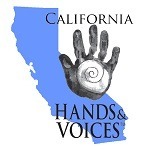by Dakota Ronco
If you asked me whether being mainstreamed with interpreters or attending to a residential school for the deaf was better, I would not have an answer. My experiences shaped me into who I am. If I had graduated from a public high school, I would have not grown as much socially, nor would I have had opportunities to be thoroughly involved with my school. On the other hand, if I had grown up in a residential school for the deaf, I would not have learned how to adapt to various situations, how to stand up for myself, and how to ensure that I got what I needed to be successful.
I grew up bilingual, American Sign Language as my primary language. My family learned how to sign upon finding out I was Deaf at 18 months old, and they supported me in my decisions regarding my future, my education, and my desires. I grew up mainstreamed with interpreters on my side, from kindergarten to sophomore year in high school. I have fond memories from those years and friendships that have faded over time as well as friendships that have endured throughout the years. I was also bullied often in school, but it did not change how I feel about being mainstreamed. It is a part of the experience that made me a stronger and alert person in tune to others’ body languages.
I also began attending to summer camps for DHH children and those summers remain my favorite childhood memories. A week of being able to be myself without lipreading or interpreters or explaining to anyone about maintaining eye contact with me. I’d meet others like me, brilliant kids being mainstreamed. I’d meet other brilliant kids who went to residential schools for the deaf. The people I met at those summer camps are now my closest friends, my trusted inner circle.
More often than not, I was the only Deaf student in all of my classes. The interpreters were the best; they got the information I needed, they offered support, and they made me feel included. I am still in touch with many of my former interpreters. Being mainstreamed means that you build a network wherever you go, because you have to learn how to speak up for yourself, how to get what you need, and how to approach various situations. That is the beauty of being involved with the deaf community: you are never alone.
Despite the support I had, being mainstreamed had its downfalls. I never quite fit in entirely. I went to the library almost everyday in high school to drown myself in books. My education was up to date and I was one of the best students all around, however, I did not grow emotionally or socially. Friends were few and rare. It was a gradual realization in my sophomore year of spending all of my free time in the library and chatting with the interpreters rather than peers my own age, that maybe being mainstreamed did not fit me anymore. Being mainstreamed was a pair of shoes I had outgrown.
I started by stopping wearing my hearing aids. It gave me a sense of independence to embrace my Deaf identity. I could hear with them on, but it did not benefit me much. I still needed to lipread, gesture, write back and forth, or sign to communicate. While I could hear with hearing aids, I still could not identify all the sounds nor could I tell where they were coming from. People also assumed that because I had hearing aids on, I could miraculously understand everything, even though that was the opposite from the truth. It started to seem pointless to wear hearing aids.
And then I started to look at residential schools for the deaf. My family and friends from summer camps were tremendously supportive and encouraged me to seek for a fresh start and to be happy. I toured several schools before settling on one that was the closest to home: California School for the Deaf, Riverside.
The summer before my junior year, I was thrilled and nervous. I had no idea what to expect. I had always been in classes with at least thirty other students, desks lined up in rows, me in the front, and I was always prepared to simultaneously watch the interpreter and the teacher. And now I was going to be in small classes, maybe five to eight students at most, desks arranged in crescents, and I would watch the teacher directly. I worried whether I would be able to understand everything. I worried about classes being too easy. I worried about cliches, bullies, and being excluded.
It was nothing like I had expected. I took Honors and Advanced Placement classes, and they were equally- maybe more- challenging than before. The classes were small, almost comical to me at first, but I grew used to having reliable peers with entirely different perspectives than I. My largest class had eleven students, and my smallest had a sole student: me. I had direct communication with the teachers and for the first time, I was utterly and completely independent without anyone by my side. I started to speak up more. I joined clubs, organizations, and sports. I hadn’t realized how thirsty I was for an opportunity to be truly involved without working to prove my worth.
My junior and senior years flew by with memorable times with my friends, adventures, all nighters, last minute projects, and the timelessness CSDR seemed to have. I graduated in June as the valedictorian with the biliteracy seal for both ASL and English, one of the first four students to ever receive that seal. I graduated with satisfaction and a sense of accomplishment, prepared to take on the future at Gallaudet University with a full ride there.
I would have not traded my experiences for anything else. They made me into the person I am today: Dakota Ronco, over and out.
